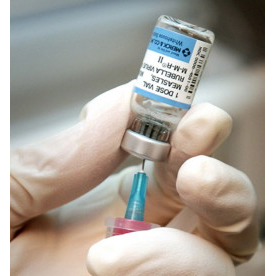A quirk of modern culture is the way that science has become a matter of belief.
People say they don’t “believe” in climate change or say that evolution by natural selection is “just a theory.” They apply impossibly rigorous standards to the findings with which they disagree and uncritically accept any fringe opinion that supports their point of view. No mere majority of scientific opinion, now matter how overwhelming, can ever be trusted, and no dissenting view is too far out.
OPTING OUT
This is the arena in which the use of life-saving vaccinations is being challenged. Even though there is a clear consensus among researchers and health professionals that widespread vaccinations of children not only give individuals the best defense against a potentially deadly or disabling disease, but they also give the community its best chance of avoiding epidemics.
Despite the mountain of evidence to the contrary, many cling to the belief that vaccines are risky, and people should be free to choose whether they vaccinate their children.
Maine has a long libertarian streak, and for years has been one of the few states that allow parents to opt out of vaccinating their children for “philosophical” reasons.
We don’t know what philosophy advises that people trust Internet rumors over the advice of dedicated health professionals, but it should not be allowed to put any more Maine children at risk.
On Friday a legislative committee voted to supportL.D. 471, a bill that would require parents who claim such an exemption should have to consult with a doctor before they can opt out. That would be an improvement, but it doesn’t go nearly far enough.
We supported a stronger bill, L.D. 606, which would have ended the practice of allowing unvaccinated children to go to school based on their parents’ philosophical choice. If parents want to opt out of vaccines, they also should opt out of other activities that put their neighbors at risk. That includes sending children to kindergarten without immunity to common diseases.
Not everyone can be vaccinated. Some children have compromised immune systems that make them vulnerable to a stray virus. They rely on what’s known as herd immunity, which occurs when vaccination rates are so high in communities that the chances of being in contact with infected person is near zero.
The success of herd immunity is perversely what makes this debate possible. If children were routinely dying of diphtheria, as was common a century ago, what parent would even consider opting out of a medical miracle that could protect their child? Only because the real danger has become so rare can theoretical dangers be entertained.
RATES VARY
If you want something to be scared about, consider this: Doctors say that herd immunity works best when 95 percent of the population is immunized. Maine’s immunization rate hovers dangerously close to that figure, but it’s even worse than that.
Immunization rates vary wildly from school to school. According to an investigation by the Maine Sunday Telegram, in at least 39 primary schools, 80 percent or fewer students get the measles vaccine, including only 37.5 percent of kindergartners at Fiddlehead School of Arts and Sciences in Gray, a public charter school, and 55 percent of first-graders at Bay Ridge Elementary School in the Washington County town of Cutler.
If this were a case of neglectful parents who have not bothered to keep up with the vaccination schedule, it simply would be a matter of getting the word out to the public.
But now the problem is attentive parents who do not to believe the evidence from health authorities that vaccinations save lives and choose to listen to dissenting voices on the fringe that speak only about the risks.
More information does not appear to help. The majority of people who want to protect their children from diseases should not have to pay the price of other people’s philosophical musings.
It’s not a question of belief. Parents should either vaccinate their children or not send them to public schools where they put other people’s children at risk.
Send questions/comments to the editors.



Success. Please wait for the page to reload. If the page does not reload within 5 seconds, please refresh the page.
Enter your email and password to access comments.
Hi, to comment on stories you must . This profile is in addition to your subscription and website login.
Already have a commenting profile? .
Invalid username/password.
Please check your email to confirm and complete your registration.
Only subscribers are eligible to post comments. Please subscribe or login first for digital access. Here’s why.
Use the form below to reset your password. When you've submitted your account email, we will send an email with a reset code.